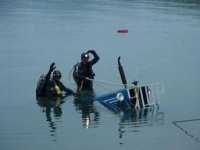I have been fully immersed in 32-degree water a few (painful) times in my life. Once as a kid, in early winter, some of use went through some ice riding our bikes across a frozen pond. It was shallow enough so we could wade/crawl out. We ran all the way home, crying the whole way about how cold we were.
Another time as an adolescent, I became involved in a stupid male-bonding pissing contest over who could stay in the water the longest, crouching neck-deep in a lake on a spring day (maybe 45 degree air temp) the day after the ice melted. I think the winning time (not me) was less than a minute.
Most recently as an adult, a few seasons ago, extracting my dock and boat lift from the lake late in the season. Wading in waist-deep water, I had to duck my head under the water to attach a strap near the bottom of the boat lift. I immediately went back in the house, shivering the whole 200 feet, took a hot shower, and put on dry clothes before I even thought about connecting the other end of the strap.
Next spring before I put the equipment back in the water, I added wheels and provisions to attach the line without getting wet.
I have also witnessed people putting their snowmobiles into open ice water, and other stupid things near or in icy water. If you can climb out or be assisted out of the water quickly enough, its definitly survivable. Alone, in deep water without anything to help climb out, or without any nearby ice to climb out on, yes, I would agree - death by hypothermia-induced drowning in a matter of minutes.
If you are talking about salt-water, it gets even colder before it freezes. I would imagine that what you would need to survive a boating accident in arctic salt water would be a dry survival suit, and you would have to have it already on when you hit the water.
- Rick

